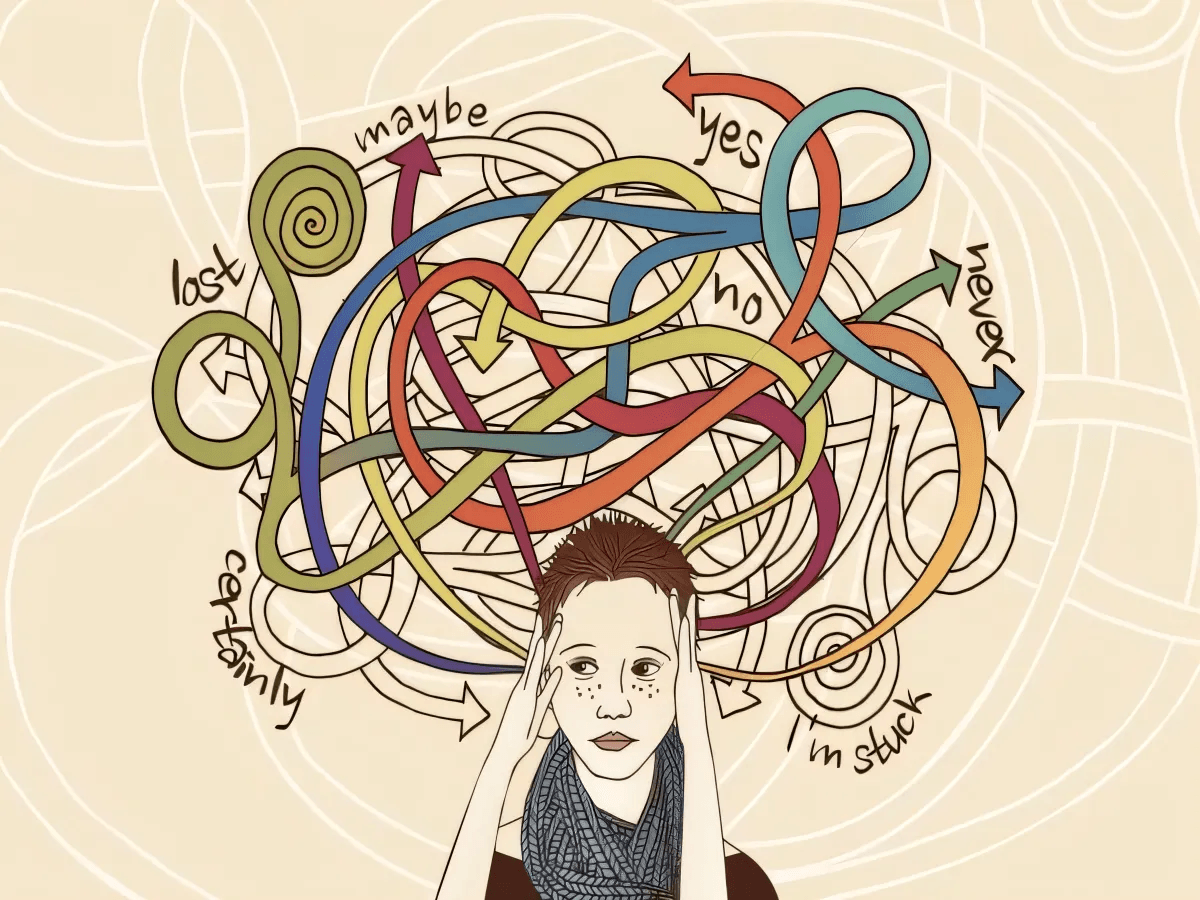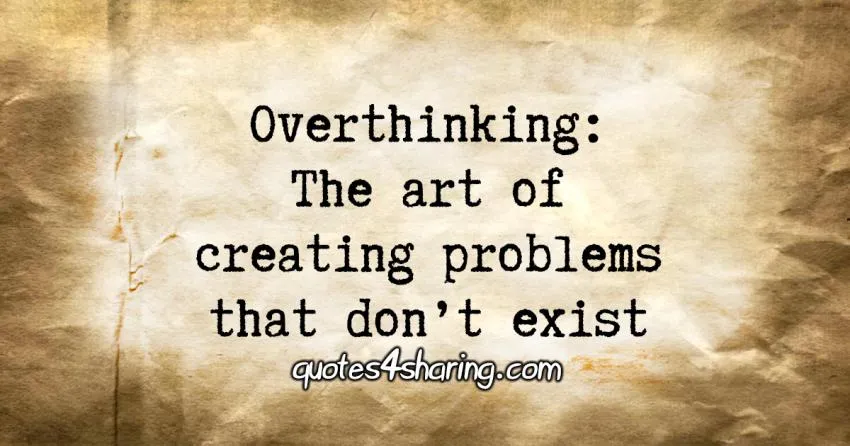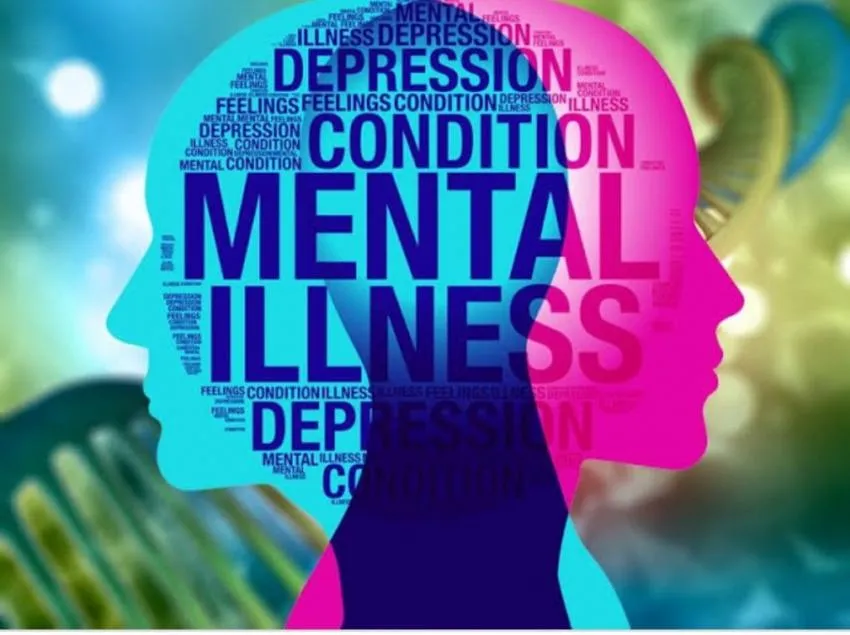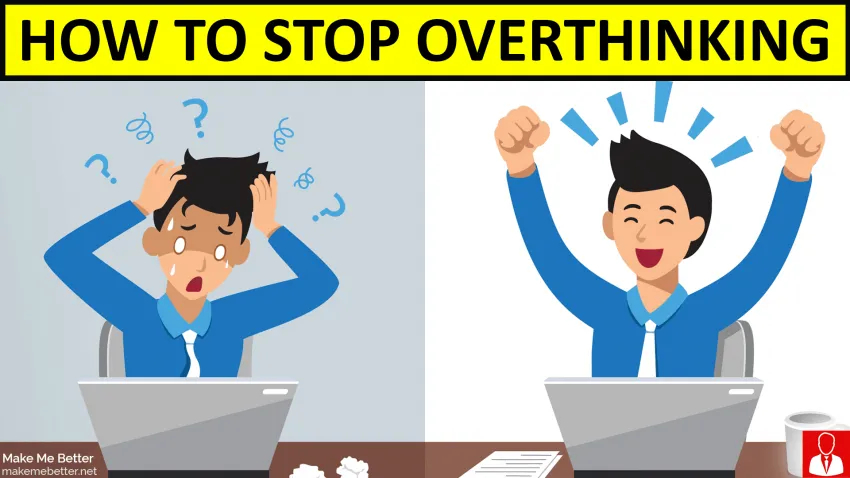How To Deal With Stressful Life Situations And Stop Overthinking

"Overthinking, also, best known as creating problems that are never there." - David Sikhosana
We spend our life dealing with its challenges and problems, trying to live our lives as best as possible. Life has its surprises, good and bad, and problems are our everyday life. What has shaped our life are not just the problems, but also our reactions towards them.
Our reaction has made the main difference in the life we have created for ourselves. Charles R. Swindoll has wisely stated:" Life is 10% what happens to you, and 90% how you react to it." Consequently, whatever happens to you and whatever situations you go through, it is not wise to overthink. Life is better lived when we accept what is beyond our power, and see the wisdom in life situations.
What is overthinking?

If we want to paraphrase overthinking maybe the best definition for it would be, "to think about something too much for too long." All human beings go through such a process when they face big challenges in their lives, it's part of making us, humans.
Trying to evaluate the situation and make the right decision turns into an overthinking process if you are stuck in your head. It happens to all of us in our lifetime due to bad experiences that stress and worry us.
Some people are constantly worried about something. They may be worried about the future anticipating bad scenarios that haven't occurred yet, or they may be stuck in the past dealing with what could have gone right or wrong. They are too much concerned about other people's opinions about them, thus they create negative self-talk in their minds.
Overthinking about a great matter of concern can be problematic because trying to evaluate all options can create "paralysis by analysis" which is taking no action due to fear of making something wrong. But a wrong decision is better than no decision.
As per the research conducted by The University of Harvard, they link overthinking with grave health issues such as symptoms of depression, which can increase stress levels and impair your judgment.
Overthinking is known as well as ruminating, dwelling, and worrying. Psychology today has defined this concept of thoughts on an endless loop with negative results, calling it "redundant deliberation." All this creates anxiety and our minds have to work harder to solve more difficult problems with different variables. It is complex enough to cause confusion and frustration, but not enough to tap our full creative potential.
The overthinking brain finds difficulties in translating the thinking process into real action or positive results, hence it generates feelings of stress and anxiety. This habit stops us from taking action. It leads to wasting energy, disables our ability to make decisions, furthermore it puts us into a vicious cycle. It can prevent us from doing progress in life.
Is overthinking a mental disorder?

By classical definition, overthinking is a thought process that consumes mental power (energy) and does not add any additional value. It is not a mental disorder, although it can be categorized as a symptom of another underlying mental health problem.
According to Dannielle Haig, the Principal Psychologist from DH Consulting, 'overthinking' and excessive worrying can certainly be a debilitating problem, however, it is not a mental l disorder but a symptom of various disorders such as anxiety, depression, and PTSD.
There is no such thing as an overthinking disorder, but anxiety and overthinking are very common issues. There is also a tendency that overthinking can be affiliated with several mental health conditions. Overthinking can be a symptom of different mental health problems, anxiety included.
There are plenty of anxiety disorders when a person is engaged in overthinking or rumination, but it is not a disorder. People may ask "what causes overthinking?"
Some of the mental diagnoses when the patient ruminates nonstop are PTSD, trauma, agoraphobia, panic disorders selective mutism, separation anxiety disorder, social anxiety disorder, phobias, substance-induced anxiety disorder, or it is very likely to be another mental sickness.
Many people suffer from an anxiety disorder and have overthinking as a symptom. Let's take an example, a person who has panic disorder may overthink and anticipate the next panic attack crisis.
When they obsess about such a thing, they trigger their attack. They add anxiety to their anxiety, which is meta anxiety, and it is anxiety about being anxious. Overthinking in such cases makes things even worse.
If someone refers to an "overthinking" disorder, what they refer to is an anxiety disorder or some other disorder that can create obsessions, intrusive thoughts, or obsessive-compulsive behavior.
Overthinking goes against intuition when we deal with problems in our lives, for this reason, stopping overthinking is a positive step. Being aware of anxiety and overthinking is the first thing to bear in mind if you want to fight such issues.
Overthinking is very common. In order, to ruminate people don't need to have anxiety disorders. We may say it is part of human conditions. All the people overthink at a certain time in their life about what has been said and done.
They may be worried about work or school performance, or other people's opinions. Overthinking is pervasive but there is a solution for it, going into therapy may be very helpful to overcome this problem which is correlated to other issues that trouble you.
What triggers overthinking?

The first solution for overthinking is knowing what it is and what is the cause behind it. Consequently, it is important to bear in mind two basic elements.
At its core, overthinking is an automatic self-protection mechanism.
What is the reason behind it? The chances might be that you are worried about real-life issues, such as finances, health, work, family, relationships, and meaning. Being in control of these domains provides a feeling of wellbeing, and for certain, everybody wants the best for himself. Nevertheless, thinking about such elements in a productive way cannot improve them.
We do not overthink intentionally.
Thinking is the most normal, automatic, and habitual process, which means that overthinking becomes a habit. We do not schedule to ourselves that tomorrow we are going to ruminate for a couple of hours. The brain works and performs the way it has done in the past.
As per the factors leading to overthinking the clinical psychologist, Nick Wignall relates his conclusions about some of the real reasons that may lead to overthinking.
Childhood experiences.
Most people have developed overthinking in their early years of childhood due to painful experiences that have caused them traumas. Overthinking proved to be their only way to deal with frightening bitter experiences.
For example, a child whose parents are alcoholics has to deal with what could happen if dad comes home drunk, or similar situations. Nevertheless, the initial reason for overthinking may be different from what you experience in the present.
The true origin of it, which was developed in the past can change from the ones you experience in the present.
The illusion of control.
Among the most painful emotions is the feeling of helplessness especially when it comes to helping the ones we love when they are in distress. Unluckily for us, we have limited skills than we would like to believe.
Despite this, many people instead of confronting their helplessness, live denying it. They may have the means to help, but certain people ruminate a lot, which feels helpful but in fact, it is not.
The illusion of certainty.
It is very similar to the illusion of control, uncertainty is another thing humans can't stand. People love to feel confident about how things evolve, especially in important situations. We are anxious to shun feeling uncertain to the point of resorting to denial, pretending things to be more predictable than what they are.
Overthinking is a form of denial about uncertainty. We believe that there is a solution for the problems if we stay long enough and try hard enough. After all, we have to accept the deeply uncertain reality. The trick lies in understanding that facing uncertainty is the best solution for the long run. Only when we have the gut to live with uncertainty we can decrease its negative impact on our lives.
Perfectionism.
All about perfectionism is not being perfect, but feeling perfect. Such people cannot move on from things only because they don't feel perfect about them. Everybody knows no one is perfect but they have a very low acceptance for feeling less than perfect. Perfectionists overthink to distract themselves from feeling less perfect than their performances.
Unless you believe you have more to do then you have more to think about. Consequently, the result of it is having less time to feel imperfect. The overthinking problem might be an emotional tolerance problem. Start practicing tolerating the feeling of inadequacy to get on with your life no matter how you feel.
Secondary gain.
Some people are stuck in overthinking because they are getting something out of it. For instance, some people use it to gain sympathy and pity from the people in their lives, or it can be an excuse for procrastinating. If you don't decide because you haven't thought about it then you have an excuse for a bad decision.
Overgeneralization.
Just because a lot of thinking may work in certain areas (school or work) people believe it may work in other walks of life, just to mention conflict with your partner or grief.
Thinking is a tool some people are so good at it, and they are rewarded in some aspects of life, that has made them apply in other walks of life where it's not necessary. Those people who are experts in thinking see everything as a problem to solve by a lot of thinking.
Fear of conflict.
People, in general, don't enjoy conflict, accordingly, they try to avoid it whenever possible. This doesn't create us the opportunity to learn how to handle conflict well, making us less confident to handle them in the future.
It results in making us avoid conflict even more creating a vicious cycle. The issue is like any phobia, avoiding conflict happens because you believe confronting it is always dangerous. Although the more we avoid it without thinking logically, the more afraid we become of it.
Believing that all conflicts are dangerous will make you try to figure out how to avoid even the smallest bits of conflict, once you do it, you will generate excuses for it. Too much fear of conflict will create a lot of unnecessary thinking. Some are better to avoid, whereas some are better to confront. If you persist in avoiding external conflict then you have to deal with internal conflicts, which is overthinking.
How do I stop overthinking?

Many people deal with overthinking and ask themselves "Why do I overthink?" Additionally, they just cannot find the right answer. They have to deal with stress and worry, which are emotions they have to control. Tony Robinson said, "Let fear be a counselor and not a jailor." So it is better to apply these techniques to stop overthinking for good.
Identify the destructive thought patterns. Negative and destructive thinking come in various forms, some worse than others. They are more present during times of stress which impacts overthinking negatively. Overthinking involves two destructive thinking patterns - ruminating and incessant worrying.
Ruminating has to do with past events, for example, such thoughts may include things like:
- I should not have said that, or done that.
- I should not have quit the job.
Persistent worry has to deal with dark predictions, for example, such thoughts may include things like:
- I will not be admitted to the college.
- I will not pass the exam.
- I will fail in my new job.
Negative and destructive thinking is very often initiated from anger, fear, anxiety, and they trigger an involuntary reaction to a situation.
Keep the focus on the problem solution.
Being stuck in your problems is not going to get you anywhere, instead rather look for solutions. If there is something you have control then look for solutions to prevent the problem.
If you do not have control over the matter like for example natural disasters, then focus on things you can do like your attitude, efforts, and the way you approach it.
Put all your efforts, thought, and energy towards solutions to the problems rather than the issues. Problems generate anxiety, stress, fear, and thus they lead to overthinking. Write them down or share your problems with someone, then brainstorm for solutions rather than being stuck on their gravity and severity.
Challenge your thoughts.
Negative thinking can carry you away quite easily, but before you imagine and anticipate a dark scenario, remember that your thoughts may be exaggeratedly negative. Keep in mind that your emotions prevent you from looking at situations objectively, in such cases look for evidence. Is there any proof your thoughts are true?
Let go of the past.
Overthinkers usually ruminate about their past, what has been done and said, which prevents them from living in the present moment. We cannot change the past but we can learn from it.
When we accept the past for whatever it is, we relieve ourselves from its burden. We free our minds from mistakes and grudges which stop us from living in the moment. It will clear our mental space from overthinking.
Letting go of the past means you will not allow past mistakes to control your plans. What has been done and said will not control your emotions and by forgiving others and yourself, letting go of anger, you can change your story.
Stop your thoughts in the moment and practice being present.
When overthinking reaches its climax stop and say: "I will not give in to this." Stay focused and present. Bring your attention here and now. Take a deep breath and ask yourself: Where are you? What do you feel? What is going on in your mind? What stresses you?
As per the research conducted by scientists from Vanderbilt University, it has proven that using writing as a technology can help with metacognitive thinking, which is "thinking about one's thinking", or simply said to be aware of your thoughts. For this reason, you become more aware of your thoughts when you write them down.
The aim is to remove yourself from the "being" of your thoughts and observe them so that you can understand what they are and why they exist. Daily rituals like keeping a journal and meditation will help you better control your mind to live in the present.
Such activities decrease stress, improve focus, concentration and increase self-awareness. As per the research conducted by Harvard Medical School, they relate the benefits of meditation regarding mental stress and anxiety.
This practice takes time, it won't be easy at the start, but with time it will transform your life and be more natural. What is most important, higher awareness will decrease your overthinking.
Take control of your emotions.
Living in the moment will not get rid of your negative thinking once and for all, but it will master your emotions. For this reason, you need to identify and see the reason behind them. When you feel anxiety dig deeper. Quite often it is about facing what frightens you the most, e.g., not being in control of your life the way you want to be.
Start to understand the reason behind your overthinking and you can stop it before it begins. To stop overthinking, first, take control of your emotions. Your emotions will not be buried or ignored, but you will have to master them.
Know the difference between fear and intuition.
Fear and intuition are not the same, and understanding, will help you better deal with overthinking. Fear of a mistake is the reason for overthinking. This will create insecurity and give the impression things are not right.
When you are aware of what leads you to fear or intuition, you can stop overthinking and move into action. When you analyze your thoughts properly, you can make better decisions. After all, you have the skill to put your decisions into action to reach success.
Ask yourself the right questions.
Asking yourself the right questions will help you understand overthinking. Simply asking "why I am overthinking" will not help you. It will only cause more overthinking. Instead, focus on solutions-oriented questions that are proactive rather than those that incite rumination.
Ask "What energy am I projecting that attracts negative partners?" Questions that bring changes in your behavior and make you progress healthily, will decrease overthinking and improve the quality of your life. It means acknowledging your feelings, what you feel and why you feel that way.
Go deeper to unravel the reasons behind your emotions and understand them. Knowing is half of the battle. When you understand the origin of certain emotions you can better handle those situations and stop overthinking.
Don't focus on what can go wrong, but what can go right.
Sometimes, in certain situations, the one thing that could go wrong goes wrong. Though quite often when we project negative possibilities in our minds and feed them with our fear, we only allow overthinking to happen.
Fear of results keeps us paralyzed, even higher on the actual manifestation of the results. For this reason, don't focus on the negative; look to what is going right. When your mind experiences fear and projects failures, remind yourself of all that is going right. Subdue negative thinking to stop overthinking in its tracks.
Confessions of a recovering overthinker
The story of Claire Seeber is exceptional. She spent years worrying about what others thought of her, and the day she realized it wasn't worth it, her life changed for the better.
She says overthinkers are empathetic and passionate people. However, this can overtake the actual doings of things. It can paralyze you and make you spend your time dissecting conversations - what you did or didn't say - over the positive contributors of the conversation. Due to overthinking she felt anxious, and her ability to learn and grow was a stunt because she didn't see growth, but the only failure.
All the books and guides to help with overthinking were worthless to her. She doesn't believe overthinking is something you can just 'cure.' It is part of your being, only when you understand it and use it right, it can be a strength and not a weakness.
She says you can learn to use overthinking for good, rather than as a stress trigger. To her the main problem isn't stress or anxiety, but what you think during overthinking. She still catches herself ruminating about things.
When she catches herself overthinking she asks three things:
- Firstly, why am I thinking about this, and is it worth investing the energy?
- Secondly, will this thought or event be a blip on my radar in six months?
- And thirdly, what evidence do I have that either a) person 'x' actually has the opinion of me that I think they do, or b) my contribution to something was below par?
You can't beat overthinking completely, nevertheless, you can control it rather than letting it control you.
She has shared with us lessons from recovering from overthinking.
- They aren't insecure - they just think.
- sometimes they care too much.
- they find it difficult to sleep.
- With all the thinking they do, they can find the right ideas and solutions.
- They may not be overthinkers in all aspects of life.
Final thoughts
Our thoughts are very powerful. If you are stuck in a loop of doom it will affect your mood in a major way. By overthinking you won't get the control you may think you will. Still, that doesn't mean you are powerless to take control of your thoughts. Worrying about everything can damage the quality of your life. It will keep you away from experiences, relationships, and a sense of fulfillment.
Focus on action, love yourself, and don't let the fear stop you from building your overthinking toolkit. Overthinking can happen to all of us, and managing it is crucial if we want to live our lives meaningfully and make reasonable decisions. Overthinking means using the resources, not in the right way. Luckily for us, this means we have such resources, so what we must do is flick the switch.
We must bear in mind that overthinking is an obstacle to be productive and happy, therefore it is our duty to tame it. After all, it is not bad to create brainpower. During the process of taming overthinking, don't give up if one technique doesn't work. Some habits may be difficult to work on them, or just it's not the right time and place to implement them.
Above all, keep in mind that your mental depth gives you a major competitive advantage. After you have learned to keep overthinking in control, you will be capable to harness your sensitivity for the superpower it is.
References:
- Charles R. Swindoll quoted in Goodreads. date accessed Sept 18, 2021. https://www.goodreads.com/quotes/1169-life-is-10-what-happens-to-you-and-90-how
- David Sikhosana quoted in Positivity blog. Date accessed Sept. 18, 2021. https://www.positivityblog.com/overthinking-quotes/
Additional References:
- Daltrey, Debbie. What is overthinking - and what can we do about it. Great MInds Clinic Blog. July 27, 2016. https://www.greatmindsclinic.co.uk/blog/what-is-overthinking-and-what-can-we-do-about-it/
- Fader, Sarah. What Is Overthinking Disorder? Betterhelp. Updated February 26, 2021. https://www.betterhelp.com/advice/personality-disorders/what-is-overthinking-disorder/
- Gaudion, Andrew. Overthinking: Is it a mental illness? Experts offer tips. METRO. Wednesday, May 12, 2021. 9:00. https://metro.co.uk/2021/05/12/overthinking-is-it-a-mental-illness-experts-offer-tips-and-strategies-14525615/
- Gilley, Harry R. & Wilson, Priscilla. What is Overthinking Disorder? How to Cope With Anxiety And Overthinking. ReGain. Medically reviewed by Robin Brock. Updated August 03, 2021. https://www.regain.us/advice/psychology/what-is-overthinking-disorder-how-to-cope-with-anxiety-and-overthinking/
- Itani, Omar. 8 Steps to Help You Stop Overthinking Everything. OMAR ITANI. March 2, 2020. https://www.omaritani.com/blog/stop-overthinking
- Kay, Alan. Overthinking: Definition, Cause, Solutions, & Examples. GENERALIST LAB. Posted on 2018-11-10. https://www.generalistlab.com/insights/life/overthinking-definition-solutions-examples/
- Koa Foundations. How to stop overthinking (and get on with your day). Koa Foundatioins n.d. https://foundations.koahealth.com/blog-post/how-to-stop-overthinking/
- Matthews, Dan. 15 Ways to Stop Overthinking and Worrying About Everything. Lifehack. January 14, 2021. https://www.lifehack.org/articles/communication/how-to-stop-overthinking-everything.html
- Morin, Amy. 6 Easy Ways to Stop Overthinking Every Little Thing (and Just Enjoy Your Life). the muse n.d. https://www.themuse.com/advice/6-easy-ways-to-stop-overthinking-every-little-thing-and-just-enjoy-your-life
- Prem, Yath. How to stop overthinking: 7 simple ways. Aliabdaal. n.d. https://aliabdaal.com/how-to-stop-overthinking/#conclusion
- Raman, Ravi. 11 Simple Ways To Stop Overthinking Everything And Take Control Of Your Life. MISSION.ORG. July 13, 2017. https://medium.com/the-mission/11-simple-ways-to-stop-overthinking-everything-and-take-control-of-your-life-cf6de0b8d83f
- Robbin, Tony. How to stop overthinking. TONY ROBBINS. n.d. https://www.tonyrobbins.com/mental-health/how-to-stop-overthinking/
- Roy, Sandip. 4 Helpful Strategies To Stop Overthinking The Past. THE HAPPINESS BLOG. n.d. https://happyproject.in/stop-overthinking/#Final_Words
- Santiago, Alyssa Dalessandro. Medically reviewed by Janet Brito. Ph.D. Flip the Off Switch: How to Stop Overthinking. Greatest. July 30, 2020. https://greatist.com/health/how-to-stop-overthinking#the-takeaway
- Sasson, Remez. What Is Overthinking and How to Overcome it. SUCCESS CONSCIOUSNESS. n.d. https://www.successconsciousness.com/blog/inner-peace/what-is-overthinking-and-how-to-overcome-it/
- Seeber, Claire. Confessions of a recovering overthinker. CircleIn. n.d. https://circlein.com/confessions-of-a-recovering-overthinker/
- Smallbbusinesscoach. How to stop overthinking. SMALL BUSINESS COACH. n.d. https://smallbusinesscoach.org/how-to-stop-overthinking/
- Sperber. Sarah. Overthinking: Definition, Causes, & How to Stop Overthinking. Berkeley Well-Being Institute. n.d. https://www.berkeleywellbeing.com/overthinking.html
- Wignall, Nick. 7 Psychological Reasons You Overthink Everything. NICK WIGNALL. February 17, 2021. https://nickwignall.com/7-psychological-reasons-you-overthink-everything/
- Widing. Melody. How to Stop Overthinking Everything. Harvard Business Review. February 10, 2021. https://hbr.org/2021/02/how-to-stop-overthinking-everything
Opinions and Perspectives
The connection to anxiety disorders helps explain why some people struggle more with overthinking than others.
Important point about how overthinking can become a way of avoiding taking action.
The article could have included more real-life examples of overcoming overthinking.
The suggestions about journaling and meditation are solid starting points.
Anyone else feel like their overthinking gets worse at night? The article could have addressed that.
The focus on solution-oriented questions rather than problem-focused ones is practical advice.
I appreciate how they acknowledge that some techniques might not work for everyone.
The Harvard research mentioned really underscores the importance of addressing overthinking.
Helpful to know that overthinking isn't a disorder but can be managed with the right tools.
Never thought about how avoiding conflict leads to more internal conflict through overthinking.
Interesting how they frame overthinking as misused mental resources rather than inherently bad.
The distinction between productive problem-solving and unproductive overthinking is helpful.
The mention of writing as technology for metacognitive thinking is fascinating.
I like how they emphasize using overthinking positively rather than just trying to stop it completely.
The article makes good points about control and certainty illusions driving overthinking.
The section about overgeneralization hit home. I definitely apply analytical thinking where it's not helpful.
Really appreciate how they emphasize that complete elimination of overthinking isn't the goal.
The advice about letting go of the past is crucial but they could have provided more specific strategies.
Good point about how overthinking in one area of life doesn't mean you overthink everything.
I relate to the paralysis by analysis concept. Sometimes I get so stuck analyzing I never take action.
The connection between overthinking and empathy is interesting. Makes sense that sensitive people might be more prone to it.
Recognizing overthinking as a habit rather than something we choose to do helps reduce self-blame.
Meditation has been a game-changer for me in managing overthinking. Takes practice though.
The tips about staying present are helpful, but I find it challenging to implement in real situations.
Important point about how overthinking can prevent us from taking action and moving forward.
The concept of redundant deliberation explains why overthinking feels so exhausting.
I appreciate how they acknowledge that different techniques work for different people.
The article could have included more specific exercises or worksheets for managing overthinking.
Never considered that my overthinking might be linked to childhood experiences. That's something to discuss with my therapist.
The section about conflict avoidance resonates. I definitely overthink to avoid confrontation.
They make a good point about overthinking being an automatic protection mechanism. Understanding why we do it helps address it.
Anyone tried the three questions technique from Claire's story? Curious about real results.
The suggestion to focus on what could go right instead of wrong is simple but powerful.
The Harvard research linking overthinking to depression is concerning. Shows how important it is to address this issue.
I found it helpful how they explained the difference between rumination about the past and worry about the future.
The comparison of overthinking to a loop of doom is spot on. Once you're in it, it's hard to break free.
Love the practical approach of writing thoughts down to gain perspective. It's simple but effective.
The article could have gone deeper into the physical health impacts of chronic overthinking.
Interesting how they mention overthinking can be a competitive advantage when properly managed.
The link between overthinking and perfectionism explains why so many high achievers struggle with this.
Start small! I began with just the breathing exercises and gradually added other techniques as I got comfortable.
Wonder if anyone else feels overwhelmed by all these strategies? Where do you even start?
The section about secondary gain was enlightening. I never considered that I might be getting something out of my overthinking habit.
I find it fascinating how overthinking can be both a strength and weakness depending on how you channel it.
The tips about focusing on solutions rather than problems are practical. I'm going to try implementing that approach.
That's a fair point about decisions, but I think the article means we shouldn't let analysis paralysis prevent us from ever moving forward.
Wouldn't say wrong decisions are better than no decisions. Sometimes waiting and gathering more information is the smart choice.
The concept of meta anxiety - being anxious about being anxious - explains so much about my thought patterns.
I've started meditation as suggested and while it was tough at first, it's helping me stay more present.
The quote about life being 10% what happens and 90% how you react to it really struck me. It's all about perspective.
Anyone else find it ironic that I'm overthinking about an article about overthinking?
The section about perfectionism really called me out. I definitely use overthinking to avoid feeling imperfect.
I appreciate that it acknowledges you can't completely stop overthinking but can learn to control it. Feels more realistic than promising a complete cure.
Interesting how the article mentions overthinking isn't actually a disorder but can be a symptom of other mental health issues.
The distinction between fear and intuition is crucial. I never thought about how often I confuse the two.
Yes! I've been journaling for six months and it's made a huge difference. Getting thoughts out of my head and onto paper helps me see them more clearly.
Has anyone tried the journaling technique mentioned? I'm curious if it actually helps reduce overthinking.
Reading Claire Seeber's story was eye-opening. I love her three questions approach to catching herself overthinking.
The tips about challenging thoughts are helpful, but I find it's easier said than done. When you're in that spiral, it's hard to be objective.
I disagree that wrong decisions are better than no decisions. Sometimes taking time to think things through carefully is important, especially for major life choices.
The part about childhood experiences resonates deeply. Growing up with unpredictable parents definitely shaped my tendency to overthink everything.
This article really hits home. I've been struggling with overthinking for years and never realized how much it was affecting my mental health.
